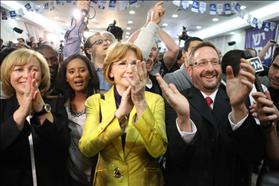The numbers speak for themselves
Hiddush election analysis shows impact of religion/state issues on voters' decision-making
After looking at polling conducted both before and after the 2013 Knesset elections, Hiddush noticed a strong trend in voters minds regarding religion/state issues. Rabbi Uri Regev: "Israel must not miss out on this historic opportunity for freedom of religion in Israel."
15/02/2013 10:39
Tags: elections 2013, government coalition, religion and state, Yesh Atid

New Yesh Atid Knesset Members celebrating at the Victory Party after the 2013 Elections (from R-L) Rabbi Dov Lipman, Yael German, Pnina Tamano-Shata, Rina Frankel
Analysts have always looked at the Israeli political climate in terms of the Right versus the Center-Left. In these elections, pundits expected the political Right to devour the Center-Left and claimed that Israel is dramatically turning to the right. Hiddush's systematic polling from before and after the elections, as well as in past years, reveals an additional, growing dimension: These elections were not dominated by public concern over the issues that once took precedence in Israel and in American Jewish circles, like security and foreign policy, but rather by the economy and a social agenda, with a strong focus on issues of religion and state. Freedom of religion, integrating ultra-Orthodox students into the army and workforce, the growing assault on gender equality based on religious fundamentalism, and civil marriages are the some of the major issues in this shift. We maintain that without properly understanding the additional element of religious freedom and equality, politicians and observers are missing a flowing current in Israeli life to the point of misunderstanding what makes the average Israeli tick.
Hiddush conducted a study before the elections which showed dramatic results. For 67% of the Jewish public, issues of religion and state will greatly impact their vote. Among undecided voters, that sentiment was expressed by 70%. Our post-election polling further validated this trend and confirmed our expectations for the elections; 80% of Jewish voters want a "civil government, committed to a new direction in religious freedom and equality." This includes not only 99% of Yesh Atid voters, but also 87% of Likud-Beitenu voters!. These results further the findings of our annual Israel Religion-State Index, which shows that the Israeli public wants the government to raise the priority of religious freedom and equality in sharing the burden.
We are committed to provide the public and policymakers with reliable research and recommendations for change. We are dedicated to working with like-minded organizations and public figures in Israel and to build partnerships with Jewish communities around the globe to advance the vision of Israel in which religious freedom and equality are fully realized.
We suggest this data and analysis will best explain why the Yesh Atid and Meretz parties came ahead of the polls in the last election, and Labor, Tzipi Livny's Hatnuah, and Kadima lagged behind. The former were perceived by the public as raising high the flag of religious freedom and equality in the civic burden. It is no surprise that as the candidate who was most and equality, Yair Lapid was voted into the position of political kingmaker for the next government coalition. Those who understood the need for religious freedom in Israel were rewarded by the public's votes. Those who ignored the call paid the price.
Yair Lapid made his commitment to religious freedom clear last week at the Conference of Presidents of Major American Organizations in Jerusalem, when he called for equality amongst Jewish denominations and for a serious upheaval in the Israeli religious establishment. Lapid emphasized that, The complete dominance of the Orthodox rabbis in Israel over divorces and marriages is an insult.". These are the voices Israel voters chose and we need to hear more of them in the Knesset.
Hiddush's work over the last few years in raising public consciousness and understanding of the need for religious freedom and equality has clearly contributed to public discourse and the helped shape the mindset supporting a civil government. Given the balancing acts that we are accustomed to seeing in the Israeli political scene, we know our work is far from finished.
We are committed to provide the public and policymakers with reliable research and recommendations for change.We are dedicated to working with like-minded organizations and public figures in Israel and to build partnerships with Jewish communities around the globe to advance the vision of Israel in which religious freedom and equality are fully realized. With all of these efforts combined, we will ensure that the trends revealed in the last elections find their translation into policy changes.